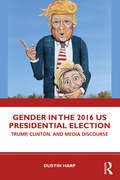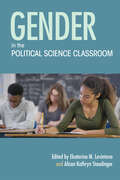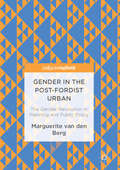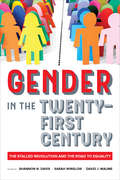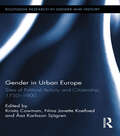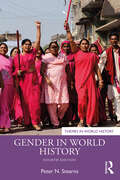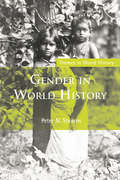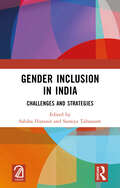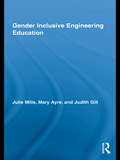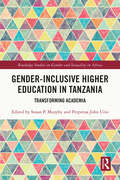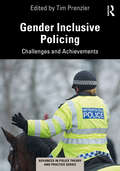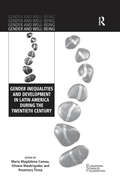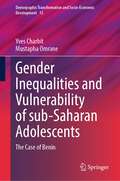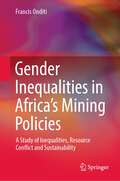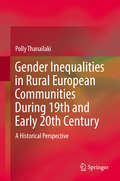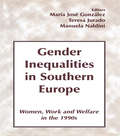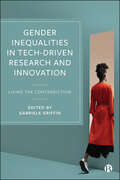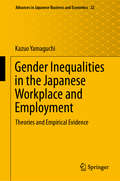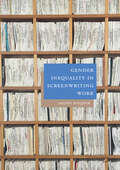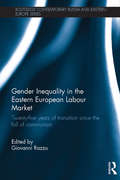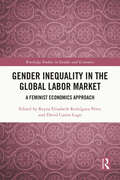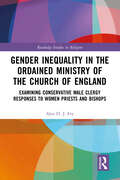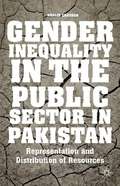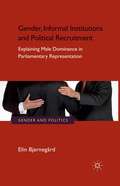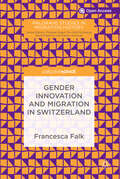- Table View
- List View
Gender in the 2016 US Presidential Election: Trump, Clinton, and Media Discourse (Global Gender)
by Dustin HarpUsing a discourse analysis, Dustin Harp investigates media during the 2016 US presidential election to explore how traditional (patriarchal) and feminist ideas about gender played out during the campaign. The book illustrates how these two ideologies competed for space and struggled for discursive authority. A broad range of media texts is examined, and "gender moments," where gender became a dominant part of the political conversation, are identified. These include the "nasty woman" and "grab them by the pussy" comments of Donald Trump and the "woman card" played by, and against, Hillary Clinton. Furthermore, Harp reveals how binary notions of gender and stereotypical ideas of how men and women should behave, look, and sound structured the ways Donald Trump and Hillary Clinton were talked about in the media. As a counterpoint, the research also shows the ways feminist ideologies worked against the sexism and misogyny and became mainstream in media discourse during the campaign. Students and researchers of Gender Studies will find that the "gender moments" in Gender in the 2016 US Presidential Election tell a broader story about women, gender expectations, and power. They offer important and timely insights about misogyny and sexual harassment in contemporary US culture and feminist resistance in a mediated public sphere.
Gender in the Political Science Classroom (Scholarship Of Teaching And Learning Ser.)
by Ekaterina M. Levintova Alison Kathryn StaudingerA collection of studies examining the role of gender in teaching and learning in the traditionally male-dominated field of political science.Gender in the Political Science Classroom looks at the roles gender plays in teaching and learning in the traditionally male-dominated field of political science. The contributors to this collection bring a new perspective to investigations of gender issues in the political behavior literature and feminist pedagogy by uniting them with the Scholarship of Teaching and Learning (SoTL). The volume offers a balance between the theoretical and the practical, and includes discussions of issues such as curriculum, class participation, service learning, doctoral dissertations, and professional placements. The contributors reveal the discipline of political science as a source of continuing gender-based inequities, but also as a potential site for transformative pedagogy and partnerships that are mindful of gender. While the contributors focus on the discipline of political science, their findings about gender in higher education are relevant to SoTL practitioners, other social-science disciplines, and the academy at large.“A bold and compelling collection that asks important questions about the ways in which the teaching of Political Science reproduces gender inequities.” —Aeron Haynie
Gender in the Post-Fordist Urban
by Marguerite van den BergThis book investigates the gender revolution in urban planning and public policy. Building on feminist urban studies, it introduces the concept of genderfication as a means of understanding the consequences of post-Fordist gender notions for the city. It traces the changes in western urban gender relations, arguing that in the post-Fordist urban landscape gender is used for urban planning and public policy – both to rebrand a city’s image and to produce space for gender-equal ideals, often at the cost of precarious urban populations. This is a topic that remains largely unexplored in critical urban studies and radical geography. Chapters cover how Jane Jacobs’ perspectives provide an alternative to the patriarchal modernist city for contemporary planners and using Rotterdam as a case study Van Den Berg discusses why new urban planning methods focus on attracting women and children as new urbanites. Topics include: forms of place marketing, gender as a repertoire for contemporary urban Imagineering and the concept of urban re-generation. The final chapter investigates how cities aiming to redefine themselves imagine future populations and how they design social policies that explicitly and particularly target women as mothers. Scholars in all fields of urban studies will find this work thought-provoking, instructive and informative.
Gender in the Twenty-First Century: The Stalled Revolution and the Road to Equality
by Shannon N. DavisHow far have we really progressed toward gender equality in the United States? The answer is, “not far enough.” This engaging and accessible work, aimed at students studying gender and social inequality, provides new insight into the uneven and stalled nature of the gender revolution in the twenty-first century. Honing in on key institutions—the family, higher education, the workplace, religion, the military, and sports—key scholars in the field look at why gender inequality persists. All contributions are rooted in new and original research and introductory and concluding essays provide a broad overview for students and others new to the field. The volume also explores how to address current inequities through political action, research initiatives, social mobilization, and policy changes. Conceived of as a book for gender and society classes with a mix of exciting, accessible, pointed pieces, Gender in the Twenty-First Century is an ideal book for students and scholars alike.
Gender in Urban Europe: Sites of Political Activity and Citizenship, 1750-1900 (Routledge Research in Gender and History #19)
by Krista Cowman Åsa Karlsson Sjögren Nina Javette KoefoedThis volume offers an integrated set of local studies exploring the gendering of political activities across a variety of sites ranging from print culture, courts, government and philanthropic bodies and public spaces, outlining how a particular activity was constituted as political and exploring how this contributed to a gendered concept of citizenship. The comparative and transnational perspectives revealed through combining such work contributes to establishing new knowledge about the relationship between gender, citizenship and the development of the modern town in Northern Europe.
Gender in World History (Themes in World History)
by Peter N. StearnsGender in World History integrates gender history and world history by dealing with significant global changes over time, regional patterns of gender relations, and the results of interregional contact on gender roles and concepts. Now in its 4th edition, this volume explores the rise of patriarchal gender systems and, in more modern history, the gradual and checkered decline of these systems. In addition to the roles of agriculture and then industrialization in shaping gender relations, the book deals with the impact of major religions, imperialism and decolonization, and human rights movements in more recent history. Regional coverage includes East Asia, South Asia, the Middle East and Mediterranean, Sub-Saharan Africa, Europe and the Americas. The book seeks to show how major patterns and changes in the past shed light on current gender issues in many world regions, enabling students to understand how gender roles have varied across the world and over time. This new edition also includes: More material on several societies, particularly in Asia and the Middle East Greater attention on historical and comparative assessment of sexual identities A focus on basic features of gender configurations Discussions of more recent human rights movements Providing a global but succinct overview of the history of gender throughout the world, Gender in World History remains essential reading for students of world history and gender studies.
Gender in World History (Themes in World History)
by Peter N. StearnsCovering societies from classical times to the twenty-first century, Gender in World History is a fascinating exploration of what happens to established ideas about men, women, and gender roles when different cultural systems come into contact. The book breaks new ground to facilitate a consistent approach to gender in a world history context. Now in its third edition, the book has been thoroughly updated, including: expanded treatment of Africa under Islamic influence expanded discussion of southeast Asia a new chapter on contemporary Latin America representations of individual women engagement with recent work on gender history and theory. With truly global coverage, this book enables students to understand how gender roles have varied across the world and over time, and the vital role of gender in structuring social and political relationships. Providing a succinct, current overview of the history of gender throughout the world, Gender in World History remains essential reading for students of world history.
Gender Inclusion in India: Challenges and Strategies
by Sabiha Hussain Suraiya TabassumThis book not only aims at highlighting existing inequalities between men and women, but also their efforts to overcome these challenges, especially so in women belonging to marginalized communities. It tries to explore systematic denial of rights to marginalized women—opportunities and resources that are normally and easily available to other members of a group, and which are fundamental to social, political integration and observance of human rights such as housing, employment, healthcare, civic engagement and democratic participation. The authors through their in-depth discussions and writings have tried to sketch Equal World as imagined by John Stuart Mill in the opening lines of The Subjugation of Women. This book is co-published with Aakar Books. Print edition not for sale in South Asia (India, Sri Lanka, Nepal, Bangladesh, Pakistan and Bhutan)
Gender Inclusive Engineering Education (Routledge Research in Education)
by Julie Mills Mary Elizabeth Ayre Judith GillWomen continue to comprise a small minority of students in engineering education and subsequent employment, despite the numerous initiatives over the past 25 years to attract and retain more women in engineering. This book demonstrates the ways in which traditional engineering education has not attracted, supported or retained female students and identifies the issues needing to be addressed in changing engineering education to become more gender inclusive. This innovative and much-needed work also addresses how faculty can incorporate inclusive curriculum within their courses and programs, and provides a range of exemplars of good practice in gender inclusive engineering education that will be immediately useful to faculty who teach engineering students.
Gender-Inclusive Higher Education in Tanzania: Transforming Academia (Routledge Studies on Gender and Sexuality in Africa)
by Susan P. Murphy Perpetua John UrioWhilst there is an extensive body of research exploring the barriers to gender equality and female empowerment in high-income states, there are far fewer systematic analyses within lower-income settings. This book draws on extensive empirical data to analyse gender mainstreaming and gender transformative actions in Tanzanian higher education.The book maps the practical landscape of gender mainstreaming across 14 universities in Tanzania, and the theoretical landscape of African theories of masculinities and femininities underpinning educational institutions and practices. It then assesses the Gender Awareness and Transformation through Education project, which was designed to support the development of gender expertise and capacities in research and education at one specific institution, across both its administrative and academic units. Current and future academics at Dar es Salaam University College of Education were trained in gender-based research and education, and a strategic plan was developed to guide in the establishment of a Gender Research Centre that will provide gender expertise in research and teaching to the College; and, over time, to other HEIs nationally and regionally. By bringing together real-world insights from action-based research, the book demonstrates the impact of real-time social change and gender transformation, with implications both for Tanzania and beyond.Bringing novel empirical insights and policy recommendations, this book will be of interest to researchers and policy makers across the fields of gender studies, education, and African studies.
Gender Inclusive Policing: Challenges and Achievements (Advances in Police Theory and Practice)
by Tim PrenzlerGender Inclusive Policing: Challenges and Achievements is an edited collection focused on current challenges, innovations and positive achievements in gender integration in policing in different subject domains and locations. Comprised of essays by expert contributors from across the globe, the book covers a variety of topics including jurisdictional achievements (South Africa, British Isles, Scandinavian countries, Australia), women in leadership (achievements and methods, merit and affirmative action issues), performance comparisons (conduct, ethics, peacebuilding), intersectionality (Indigenous women) and women’s police stations (Argentina). The book explores and grapples with issues of recruitment, deployment and promotion; obstacles to equity; effective integration strategies; management, conduct and policing styles; race and ethnicity; and specialisation. It is an essential resource providing practical exemplars for police managers involved in gender-equity programmes and for professionals involved in advanced-level research, teaching and consulting.
Gender Inequalities and Development in Latin America During the Twentieth Century (Gender and Well-Being)
by María Magdalena Camou Silvana Maubrigades Rosemary ThorpThis book presents evidence of the evolution of the gender inequalities in Latin America during the twentieth century, using basic indicators of human development, namely education, health and the labour market. There are very few historical studies that centre on gender as the main analytical category in Latin America, so this book breaks new ground. Using case-studies from Argentina, Chile, Colombia, Mexico and Uruguay, the authors show that there is evidence of a correlation between economic growth and the decrease in gender inequality, but this process is also not linear. Although the activity rate of women was high at the beginning of the twentieth century, female participation in the labour market diminished, until the 1970s, when it began to increase dramatically. Since the 1970s, fertility reduction and education improvements and worsening labour market conditions are associated to the steadily increase of women participation in the labour market. By gauging the extent to which gender gaps in the formation of human capital, access to resources, quality of life and opportunities may have operated as a restriction on women’s capabilities and on economic growth in the region, this book demonstrates that Latin America has lagged behind in terms of gender equality.
Gender Inequalities and Vulnerability of sub-Saharan Adolescents: The Case of Benin (Demographic Transformation and Socio-Economic Development #15)
by Yves Charbit Mustapha OmraneThis book analyses the vulnerability of adolescent girls, which results from cumulative inequalities: gender, lack of education, residential, and poverty. It is based on original analyses of data from the national survey carried out by the National Institute of Statistics and Economic Analysis in collaboration with UNICEF.The book discusses three main themes. First, the experience of adolescence: access to globalization, via access to TIC (Trusted Internet Connections) and mass media; subjective well-being; smoking and alcohol consumption; child discipline and domestic violence are discussed. Secondly, the book focusses on the beginning of fertile life: child marriage; early pregnancy; prenatal care; birth weight and breastfeeding. HIV/AIDS and sexuality.The third theme touches on the potential contribution of adolescents to harvesting the demographic dividend: fertility and contraception; postnatal care and vaccination of children; pre-school learning; education and gender; household health vulnerability (water and sanitation). On the basis of the analyses of data, implications regarding concrete policy measures aimed at reducing the vulnerability of adolescents are identified at the end of each chapter.Through the richness of the analyses and the methodological rigor, this book provides an interesting read to both specialists and non-specialists interested in adolescence and the future of Benin, Africa and beyond.The [basis of the] English translation of this book from its French original manuscript was done with the help of artificial intelligence. A subsequent human revision of the content was done by the author.
Gender Inequalities in Africa’s Mining Policies: A Study of Inequalities, Resource Conflict and Sustainability
by Francis OnditiThis book develops a discursive ‘equalitarian’ theoretical framework for studying African mining ecosystem issues and policy interventions. The theory of ‘equalitarianism’ is developed as an alternative to the reductionist approach that has dominated post-colonial debates about the classical jus ad bellum requirements to empower women in development spaces. However, the classical approach narrows the debate down to “women issues,” rather than the ‘whole-of-society.’ As a consequence of this reductionism, women continue to be devalued in the mining sector, characterized by poverty traps, power struggles, and a lack of capacity to engage in large-scale mining (LSM) activities. This book advances principles for a holistic approach, and spells out the implications for women across the mining value chain. Drawing on moral scholarship, the book poses that for women to gain access to strategic spaces in the mining sector, the drive for empowerment must be embedded within ‘whole-of-society’ principles. This book is of interest to scholars researching gender policy, public policy, political philosophy, conflictology, and human geography. It also offers practitioners a guide for evaluating their policy work on mainstreaming gender in the mining sector, presenting options for financing, forging partnership and planning for an inclusive economic development in Africa, and beyond.
Gender Inequalities in Rural European Communities During 19th and Early 20th Century: A Historical Perspective
by Polly ThanailakiThis book provides an overview of women’s opportunities for schooling, their social activities, and the social biases they faced in rural communities in Greece, Italy and parts of the Balkans during the 19th and early 20th century. It examines such topics as female illiteracy, the efforts of women-protestant missionaries to expand knowledge through Protestantism, the prejudice against education for women, the socio-economic context, the roles women fulfilled, and the structure of the patriarchal family. The book approaches these issues from the perspective of pedagogy and social history. The fundamental questions discussed by the book are: How was female education viewed by the country folk? What was the role of women in the private and the public sphere? How did peasant women respond to the challenges of the ‘modern’ world? Were they free to express their feelings and ambitions? In what way? Were they happy?
Gender Inequalities in Southern Europe: Woman, Work and Welfare in the 1990s
by Manuela Naldini María José González Teresa JuradoPresenting studies of the situation on gender inequalities and associated pattern of work and welfare in all southern European countries, this work focuses on the interaction of the three major societal institutions - the State, the family and the labour market.
Gender Inequalities in Tech-driven Research and Innovation: Living the Contradiction
by Gabriele GriffinePDF and ePUB available Open Access under CC-BY-NC-ND licence. The Nordic countries are regarded as frontrunners in promoting equality, yet women’s experiences on the ground are in many ways at odds with this rhetoric. Putting the spotlight on the lived experiences of women working in tech-driven research and innovation areas in the Nordic countries, this volume explores why, despite numerous programmes, women continue to constitute a minority in these sectors. Contributors flesh out the differences and similarities across different Nordic countries and explore how the shifts in labour market conditions have impacted on women in research and innovation. This is an invaluable contribution to global debates around the mechanisms that maintain gendered structures in research and innovation, from academia to biotechnology and IT.
Gender Inequalities in the Japanese Workplace and Employment: Theories and Empirical Evidence (Advances in Japanese Business and Economics #22)
by Kazuo YamaguchiThe in-depth analyses presented in this book have a dual focus: (1) Social mechanisms through which the gender wage gap, gender inequality in the attainment of managerial positions, and gender segregation of occupations are generated in Japan; and (2) Assessments of the effects of firms’ gender-egalitarian personnel policies and work–life balance promotion policies on the gender wage gap and the firms’ productivity. In addition, this work reviews and discusses various economic and sociological theories of gender inequality and gender discrimination and considers their consistencies and inconsistencies with the results of the analysis of Japanese data. Furthermore, the book critically reviews and discusses the historical development of the Japanese employment system by juxtaposing rational and cultural explanations. This book is an English translation by the author of a book he first published in Japanese in 2017. The original Japanese-language edition received two major book awards in Japan. One was The Nikkei Economic Book Culture Award, which is given every year by the Nikkei Newspaper Company and the Japan Economic Research Center to a few best books on economy and society. The other was The Showa University’s Women’s Culture Research Award, which is bestowed annually on a single book of research that promotes gender equality. Kazuo Yamaguchi is the Ralph Lewis Professor of Sociology at the University of Chicago.
Gender Inequality in Screenwriting Work
by Natalie WreyfordThis is the first book to critically examine the recruitment and working practices of screenwriters. Drawing on interviews with screenwriters and those that employ them, Natalie Wreyford provides a deep and detailed understanding of entrenched gender inequality in the UK film industry and answers the question: what is preventing women from working as screenwriters? She considers how socialised recruitment and gendered taste result in exclusion, and uncovers subtle forms of sexism that cause women’s stories and voices to be discounted. Gender Inequality in Screenwriting Work also reveals the hidden labour market of the UK film industry, built on personal connections, homophily and the myth of meritocracy. It is essential reading for students and scholars of gender, creative industries, film and cultural studies, as well as anyone who wants to understand why women remain excluded from many key roles in filmmaking.
Gender Inequality in the Eastern European Labour Market: Twenty-five years of transition since the fall of communism (Routledge Contemporary Russia and Eastern Europe Series)
by Giovanni RazzuUnder communism there was, in the countries of Eastern Europe, a high level of gender equality in the labour market, particularly in terms of high participation rates by women. The transition from communism has upset this situation, with different impacts in the different countries. This book presents a comprehensive overview of gender and the labour market since the fall of communism in a wide range of Eastern European countries. Each country chapter describes the nature of inequality in the particular country, and goes on to examine the factors responsible for this, including government policies, changing social attitudes, levels of educational attainment and the impact of motherhood. Overall, the book provides an interesting comparison to the situation in Western developed countries, outlining differences and similarities. No one single Eastern European model emerges while, as in Western developed countries, a range of experiences and trends is the norm.
Gender Inequality in the Global Labor Market: A Feminist Economics Approach (Routledge Studies in Gender and Economics)
by Pérez, Reyna Elizabeth Rodríguez David Castro LugoThis book examines gender inequality from the perspective of feminist economics, with empirical application, across different countries such as Turkey, the United States, Mexico, Uruguay, Argentina, Colombia, Costa Rica and territories within Europe.It centers on topics such as labor participation, occupational segregation, feminization of poverty and migration, wage differentials, changes in and the quality of employment, equity index, and gender bias in fiscal policies. It encompasses both developed and developing countries and shows that the gender gap has been narrowing over time, although not completely, mainly due to the sparse implementation of programs and public policies with a feminist economic approach, which help to make gender dimensions in the economy visible and highlight the implications this has on women’s lives. The book also examines the impact of the COVID-19 crisis on inequality on the working lives of men and women.This book will be an important asset in teaching forums on the most recent advances in economic science across a number of different theories, approaches and research hypotheses that explain the study of gender inequality. It also presents different empirical studies, using multiple methodologies and databases, applied to specific problems in multiple countries to identify the advances, opportunities and changes that have occurred in gender inequality from a feminist economic perspective. The book offers relevant, novel and original scientific data and makes public policy proposals to encourage the participation of women in the labor market. Consequently, it will also be of interest to policymakers concerned with global trends in the labor market.
Gender Inequality in the Ordained Ministry of the Church of England: Examining Conservative Male Clergy Responses to Women Priests and Bishops (Routledge Studies in Religion)
by Alex D.J. FryThis book offers a fresh social scientific analysis of how theologically conservative male clergy respond to the ordination of women to the priesthood and their consecration as bishops within the Church of England. The question of women’s place in the formal structures of England’s Established Church remains contested. For many, to prevent women from occupying such offices is often understood to be a matter of inequality, whereas those who oppose their ordination see it as a matter of obedience to God’s will. Tensions have become heightened in a culture that increasingly promotes the rights of individuals who have historically been marginalised and that challenges traditional social roles. This volume explores the gender attitudes held by clergy in the Anglo-Catholic and evangelical traditions of the Church and considers how these gender attitudes shape the way they think about women’s ordination and how they interact with female colleagues. It also considers the contribution of a range of social phenomena to the formation of these gender attitudes. The author draws on and develops a variety of sociological and psychological theories that help to explain the processes that lead to the formation of clergy attitudes towards gender more broadly.
Gender Inequality in the Public Sector in Pakistan
by Khalid ChauhanAs gender training is applied increasingly as a development solution to gender inequality, this book examines gender inequality in Pakistan's public sector and questions whether a singular focus on gender training is enough to achieve progress in a patriarchal institutional context.
Gender, Informal Institutions and Political Recruitment
by Elin Bjarneg�rdIn this book, men in politics are the subjects of a gendered analysis with Elin Bjarnegård exploring how male networks are maintained and expanded, seeking to improve our understanding of the rationale underlying male dominance in politics. The role of informal institutions in unpredictable political settings are explored.
Gender Innovation and Migration in Switzerland (Palgrave Studies in Migration History)
by Francesca FalkThis open access book analyses migration and its relation to socio-political transformation in Switzerland. It addresses how migration has made new forms of life possible and shows how this process generated gender innovation in different fields: the changing division of work, the establishment of a nursery infrastructure, access to higher education for women, and the struggle for female suffrage. Seeing society through the lens of migration alters the perspective from which our past and thus our present is told—and our future imagined.
